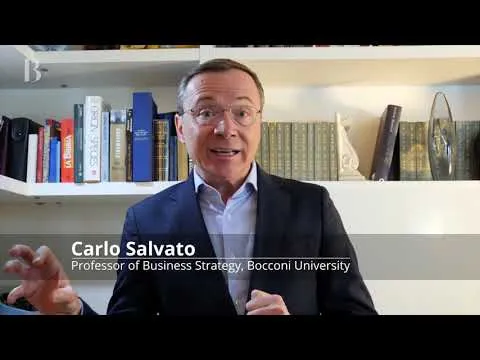
Bouncing Back Stronger Than Ever
After shocks such as earthquakes and epidemics, some firms not only bounce back almost unaffected, they even experience post-traumatic growth. «These growth champions», Carlo Salvato, a Full Professor of Management at Bocconi, says, «immediately understand the impact of the crisis on their and their industry value chains and act by innovating in order to overcome the problem or to turn it into an advantage. It's the case of companies nimble enough to adopt ecommerce solutions as soon as the current COVID19 pandemic hit».
Experience suggests that the companies that will better overcome the crisis are family firms. In a paper written with Bocconi colleagues Alessandro Minichilli and Mario Daniele Amore and with Massimo Sargiacomo from Università D'Annunzio Chieti-Pescara, Prof. Salvato found that family firms performed better than non-family businesses after the earthquake that hit Central Italy, and especially the area around L'Aquila, in 2009.
This shouldn't be a surprise, as it is widely known that family firms are characterized by greater longevity than the rest, spanning several generations and, sometimes, even centuries. Anyway, the idea that family firms are more able to deal with unexpected shocks such as financial crises, disaster events, mass emergencies, and other adverse events has never been rigorously tested.
Prof. Salvato and his colleagues monitored the performance of 89 family and non-family firms in the L'Aquila region from 2004 to 2012, observing the differences between their results before and after the 2009 earthquake. To be sure that the results were due to the reaction to the crisis, they also compared the L'Aquila sample with a sample of similar firms located in Milan, an area not affected by the earthquake.
While the earthquake represented a negative and generally significant shock to firm profitability, family firms exhibited superior post-earthquake performance.
Furthermore, the family businesses that were best equipped to capture recovery opportunities after the earthquake were those with a high involvement of family members in ownership positions and those that operated in industries closer to the public demand.
On the one hand, during disaster events family ownership resources (focused on the long term and with a desire to transfer the business to future generations) have a positive role in providing the firm with the social and emotional capital needed to address the hardship. On the other, the local contextual conditions after a mass emergency determine how family social capital, leveraging on the family proximity to politics, shape the processes of recovery and opportunity identification.
CORONAVIRUS. How companies recover from crisis
